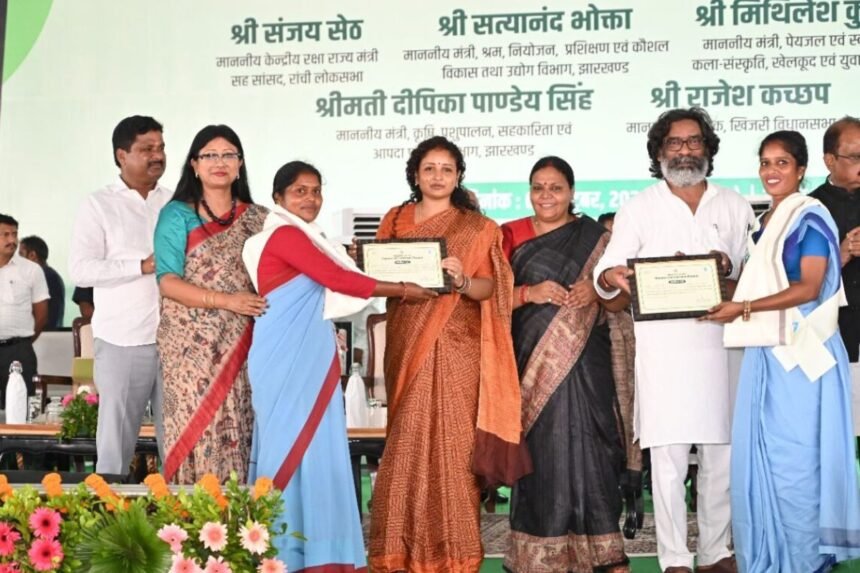Jharkhand Chief Minister Hemant Soren has taken a monumental step in strengthening rural water management by transferring ₹12,000 through Direct Benefit Transfer (DBT) to each Jal Sahiya, commonly known as Water Warriors, in the state.
This initiative aims to equip these vital grassroots workers with smartphones, enhancing their ability to monitor and manage water resources in rural areas.
The event, which witnessed the participation of key government officials such as DWSD Principal Secretary M R Meena, Agriculture Minister Deepika Pandey and JMM MLA Kalpana Soren, highlighted the government’s commitment to supporting those who safeguard Jharkhand’s water resources.
This move comes as part of a larger strategy by CM Soren to empower women, improve rural infrastructure and drive water sustainability in Jharkhand.
The DBT scheme is designed to enhance digital access for Jal Sahiyas, ensuring they can effectively carry out their crucial roles, all while being connected to real-time government updates and resources.
The Role of Jal Sahiyas: Grassroots Guardians of Jharkhand’s Water and Sanitation
Jal Sahiyas play an essential role in Jharkhand’s rural water management efforts.
Tasked with ensuring clean drinking water and proper sanitation, these women workers operate at the community level, often in areas lacking basic infrastructure.
They are responsible for monitoring water sources, educating communities on water conservation, and implementing sanitation initiatives.
For years, Jal Sahiyas have acted as the first line of defense against water scarcity and poor hygiene practices in rural Jharkhand.
Real-life examples of their work include the successful implementation of hand pump repairs, organizing clean drinking water camps and promoting rainwater harvesting. In many villages, they are seen as pivotal figures in ensuring the well-being of their communities, tackling waterborne diseases, and fostering better hygiene standards.
Empowering these women with smartphones is a game-changer.
It not only improves their communication with local and state authorities but also ensures they can swiftly report issues, receive timely updates and access valuable resources for water management.
CM Soren’s Commitment to Empowerment: Raising Honorarium and Infrastructure
Under CM Hemant Soren’s leadership, Jal Sahiyas have seen an unprecedented increase in support, both in terms of recognition and remuneration.
The honorarium provided to these workers has been raised significantly, reflecting the government’s understanding of the critical role they play.
Previously, these women often worked with little financial compensation, but the current administration has changed that, demonstrating a clear break from past policies that overlooked their contributions.
Compared to previous governments, which paid scant attention to empowering grassroots workers, CM Soren’s administration has made it a priority.
The increase in honorarium is not just a financial incentive, it’s a signal that the state values the efforts of these water warriors.
This policy shift has laid the foundation for more structured support, enabling Jal Sahiyas to work more effectively and with greater motivation.
₹12,000 Crore Fund for Women’s Self-Help Groups: A Roadmap for Rural Development
In addition to the DBT scheme for smartphones, CM Soren’s government has also allocated ₹12,000 crore for women’s self-help groups (SHGs) across Jharkhand.
These funds are designed to empower rural women, allowing them to undertake various entrepreneurial activities and community service roles, further amplifying their impact on local economies and development projects.
The ripple effects of this initiative have been substantial.
SHGs, often run by rural women, now have access to capital for new ventures, such as small-scale agricultural projects, textile production and food processing units.
These funds have not only improved household incomes but have also fostered a sense of community-driven development, with women taking charge of key sectors in rural Jharkhand.
The combination of support for SHGs and Jal Sahiyas demonstrates a holistic approach to rural development under CM Soren’s leadership.
By focusing on women as agents of change, the government is ensuring long-term sustainability in water management, sanitation and economic growth.
Enhancing Digital Infrastructure for Rural Water Warriors
Providing Jal Sahiyas with smartphones via the DBT scheme is more than just a technological upgrade.
It signifies the government’s commitment to bridging the digital divide in rural areas.
Smartphones enable these workers to access digital resources, communicate with state authorities in real time and monitor water management efforts more effectively.
The importance of digital infrastructure in rural water management cannot be overstated.
With the availability of smartphones, Jal Sahiyas can now track water quality, receive updates on sanitation projects and report issues more efficiently.
Furthermore, access to apps and tools that offer information on water conservation and health practices allows these workers to stay informed and better equipped to tackle the challenges they face.
This digital leap ensures that Jal Sahiyas are not only empowered in their work but also play a key role in Jharkhand’s larger goal of improving water and sanitation infrastructure.
The Larger Vision: Jharkhand’s Future in Water and Sanitation
The smartphone fund transfer is part of a broader vision by CM Soren to revamp water and sanitation infrastructure in rural Jharkhand. His administration has been working on various initiatives aimed at ensuring sustainable water use, improving sanitation, and building resilient infrastructure to deal with the state’s water challenges.
Future plans include expanding rainwater harvesting programs, building more efficient irrigation systems, and promoting sustainable water management practices.
The government’s focus on grassroots workers like Jal Sahiyas signals a long-term commitment to improving water access and sanitation across rural Jharkhand, ensuring that no community is left behind.
Quotes from the Event: The Words That Matter
At the event, CM Hemant Soren underscored the importance of Jal Sahiyas in Jharkhand’s water management ecosystem.
He remarked, “For too long, the contributions of Jal Sahiyas were ignored. Past governments failed to recognize their role in safeguarding our water resources. Today, we not only recognize them but also empower them with the tools they need to succeed.”
Principal Secretary M R Meena also praised the initiative, noting, “This is a transformative step for rural Jharkhand. With digital tools in their hands, our Jal Sahiyas can work more efficiently, ensuring clean water and proper sanitation for all.”
Agriculture Minister Deepika Pandey and JMM MLA Kalpana Soren echoed these sentiments, lauding the government’s focus on empowering women at the grassroots level and driving sustainable rural development.
Conclusion: A New Era of Empowerment for Rural Jharkhand
The transfer of funds for smartphones to Jal Sahiyas marks a new era in Jharkhand’s rural development strategy.
This initiative, combined with increased honorarium and support for women’s SHGs, reflects the Soren administration’s commitment to empowering rural workers and building sustainable water infrastructure.
As Jharkhand continues to progress under CM Hemant Soren’s leadership, the emphasis on grassroots empowerment, women’s involvement and sustainable development will undoubtedly pave the way for a brighter, more resilient future for the state’s rural communities.
Stay tuned for more updates on government initiatives aimed at transforming Jharkhand’s rural landscape.




